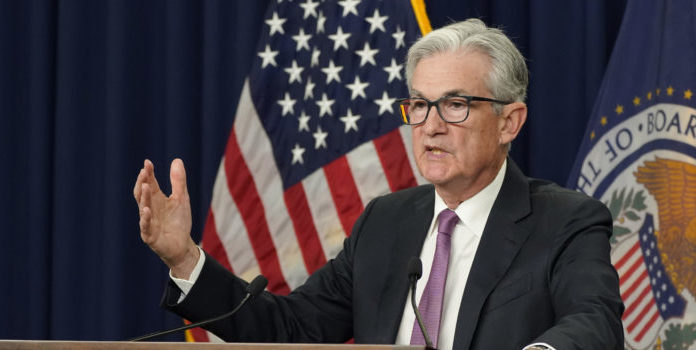(Headline USA) Federal Reserve Chair Jerome Powell delivered a stark message Friday: The Fed will likely impose more large interest rate hikes in coming months and is resolutely focused on taming the highest inflation in four decades.
Powell also warned more explicitly than he has in the past that the Fed’s continued tightening of credit will cause pain for many households and businesses as its higher rates further slow the economy and potentially lead to job losses.
“These are the unfortunate costs of reducing inflation,” he said in a high-profile speech at the Fed’s annual economic symposium in Jackson Hole. “But a failure to restore price stability would mean far greater pain.”
The announcement comes on the heels of President Joe Biden’s decree to shift the burden of some $300-500 billion in student-loan debt from the individual debtors to the taxpayers at large, giving additional disposable income to those who likely need it the least and exacerbating the very conditions that have created the historic inflationary surge.
Investors had been hoping for a signal that the Fed might soon moderate its rate increases later this year if inflation were to show further signs of easing. But the Fed chair indicated that that time may not be near.
After hiking its key short term rate by three-quarters of a point at each of its past two meetings—part of the Fed’s fastest series of rate increases since the early 1980s—Powell said the Fed might ease up on that pace “at some point”—suggesting that any such slowing isn’t near.
Powell said the size of the Fed’s rate increase at its next meeting in late September—whether one-half or three-quarters of a percentage point—will depend on inflation and jobs data. An increase of either size, though, would exceed the Fed’s traditional quarter-point hike, a reflection of how severe inflation has become.
The Fed chair said that while lower inflation readings that have been reported for July have been “welcome,” “a single month’s improvement falls far short of what the Committee will need to see before we are confident that inflation is moving down.”
Even if the rate of inflation lowers, that still means prices are increasing astronomically by the standards of most presidential administrations. Thus, there is little solace for consumers in the fact that they are increasing only by 6.5% compared with 9.5%.
Powell noted that the history of high inflation in the 1970s, when the central bank sought to counter high prices with only intermittent rate hikes, shows that the Fed must stay focused.
“The historical record cautions strongly against prematurely” lowering interest rates, he said. “We must keep at it until the job is done.”
Powell’s speech is the marquee event of the the Fed’s annual economic symposium at Jackson Hole, the first time the conference of central bankers is being held in person since 2019, after it went virtual for two years during the COVID-19 pandemic.
Since March, the Fed has implemented its fastest pace of rate increases in decades to try to curb inflation, which has punished households with soaring costs for food, gas, rent and other necessities. The central bank has lifted its benchmark rate by 2 full percentage points in just four meetings, to a range of 2.25% to 2.5%.
Those hikes have led to higher costs for mortgages, car loans and other consumer and business borrowing. Home sales have been plunging since the Fed first signaled it would raise borrowing costs.
In June, the Fed’s policymakers signaled that they expected their key rate to end 2022 in a range of 3.25% to 3.5% and then to rise further next year to between 3.75% and 4%. If rates reached their projected level at the end of this year, they would be at the highest point since 2008.
Powell is betting that he can engineer a high-risk outcome: Slow the economy enough to ease inflation pressures yet not so much as to trigger a recession.
However, recent economic data indicated that the economy is already in recession territory, with two full quarters of negative growth in the gross domestic product.
The Biden administration and its media allies responded by trying to change the definition of recession to something more abstract and nebulous that only they could explain.
Despite the economy’s contraction at a 0.6% annual rate in the April-June period, the Biden administration has continued to incentivize unemployment, resulting in a hiring crisis that continues to take its toll on consumer access to goods and services, creating ongoing supply-chain issues.
The Fed is not entirely blameless for the current economic dilemma. At last year’s Jackson Hole symposium, Powell listed five reasons why he thought inflation would be “transitory.” Yet instead it has persisted, and many economists have noted that those remarks haven’t aged well.
Powell indirectly acknowledged that history at the outset of his remarks Friday, when he said that, “at past Jackson Hole conferences, I have discussed broad topics such as the ever-changing structure of the economy and the challenges of conducting monetary policy.”
“Today,” he said, “my remarks will be shorter, my focus narrower and my message more direct.”
Adapted from reporting by the Associated Press

